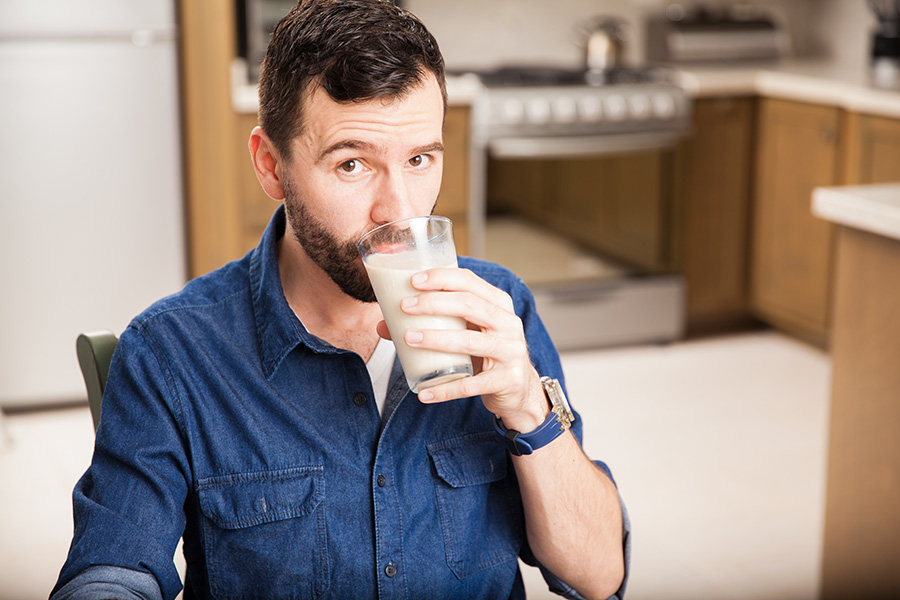
Milk is a staple in many of our diets—from pouring it over cereal in the morning to blending it into smoothies or enjoying it with cookies. We’ve been told that milk helps us grow strong and healthy, but in recovery, it may not be as beneficial as we’ve been led to believe.
If you’re on a journey to healing from addiction, understanding how milk impacts your body could be essential to your recovery. To learn more about the pro-recovery diet techniques used at The Raleigh House, contact us directly or continue reading below.
The Impact of Addiction on the Body
Addiction takes a toll on both the body and mind. Substances like alcohol and drugs deplete the body of essential nutrients, impairing the brain’s ability to produce neurotransmitters like dopamine and serotonin—the chemicals that regulate mood and decision-making. Regaining mental clarity and emotional stability becomes even more challenging without proper nutrition.
During recovery, the body craves nourishment to repair this damage. However, not all foods support healing equally. Dairy products like milk, despite being nutrient-rich, can disrupt the body’s delicate balance, making it harder to restore mental and physical health. This connection makes it important to examine how milk might impact recovery efforts.
How Milk Affects Recovery
While milk provides nutrients like calcium and protein, it may not support the body’s healing process during addiction recovery. Certain compounds in milk can interfere with the body’s ability to restore balance, making it more difficult to achieve lasting wellness.
Here’s how milk can negatively impact recovery:
- Casomorphins in Casein: Milk contains casomorphins, protein fragments that have opioid-like effects. These compounds can trigger cravings and emotional instability, mimicking the effects of substances like heroin and opioids.
- High Sugar Content: A single cup of 1% milk has 13 grams of lactose, a simple sugar that can cause blood sugar spikes, leading to mood swings and impulsive behaviors.
- Inflammation: Dairy products can cause inflammation in some individuals, slowing down the body’s natural healing process.
- Digestive Discomfort: Milk can cause bloating, discomfort, and issues with nutrient absorption for those with lactose intolerance or dairy sensitivities.
- Blood Sugar Fluctuations: The sugars in milk can cause unstable blood sugar levels, leading to cravings and impulsivity.
The Hidden Risks of Milk During Recovery
Milk contains casomorphins, protein fragments from casein that have opioid-like effects. For individuals in recovery, these compounds can mimic the brain’s response to substances like heroin and opioids, potentially triggering cravings and emotional instability.
Additionally, milk is high in fats and sugars. A cup of 1% milk contains 13 grams of lactose, a simple sugar that can spike blood sugar levels, leading to mood swings and impulsive behaviors—both risky during recovery.
Why Do People with Alcohol Use Disorder Crave Milk?
Cravings for milk among individuals with alcohol use disorder can often be traced to the body’s attempt to restore balance.
Alcohol is a diuretic, causing significant dehydration and the loss of vital nutrients such as potassium, magnesium, and calcium. Because milk is rich in electrolytes and nutrients, it can feel like a natural remedy for replenishing what’s missing.
Additionally, milk has a soothing effect on the stomach lining. Alcohol can irritate the stomach, leading to nausea or discomfort, and milk’s coating properties may provide temporary relief. This can create a subconscious association between milk and comfort, prompting cravings.
However, it’s essential to recognize that these cravings are the body’s way of signaling deeper imbalances caused by alcohol use.
While milk might offer short-term relief, it doesn’t address the root causes of substance use or the long-term nutritional deficits and damage caused by alcohol consumption. Proper medical care, hydration, and a balanced diet support recovery and restore overall health.
Why Do Individuals with Substance Use Disorder Drink Milk?
Some people living with substance use disorder believe that milk helps neutralize the acidity of certain drugs or speeds up detoxification. For instance, some methamphetamine users drink milk, thinking it helps the body process the drug faster. However, this is a myth. Milk cannot detoxify drugs or reverse their harmful effects.
Healthier Alternatives to Milk in Recovery
Replacing milk with more balanced options can support your recovery journey.
Nutrient-dense foods, such as leafy greens, lean proteins, complex carbohydrates, and natural sugars from fruits, provide lasting energy and mood stability without triggering cravings.
Hydrating with water, herbal teas, or electrolyte-rich drinks can help replenish lost nutrients.
A Holistic Approach to Nutrition at The Raleigh House
At The Raleigh House, we believe in a holistic, pro-recovery nutrition plan that fuels body and mind.
Our wellness lodge near Denver offers a carefully designed diet that removes harmful fats, sugars, glutton, and dairy products like milk. Our experienced chef prepares fresh, nutrient-rich meals, and our nutritionist provides ongoing support to help you develop healthy eating habits that last beyond treatment.
Nourish Your Body and Mind for Long-Term Recovery
Recovery is more than eliminating substances—it’s about nourishing your body and mind to build a healthier, more fulfilling life. At The Raleigh House, we support every step of your recovery, from detox to nutrition and beyond.
Choose the Healing Environment That Best Fits Your Needs:
- The Ranch at The Raleigh House: Nestled on 40 acres of peaceful Colorado countryside, The Ranch offers a serene, nature-inspired space for holistic healing through therapies like equine-assisted therapy, yoga, and mindfulness.
- The Center for Integrative Behavioral Health: Located in the Denver Tech Center, this facility offers a structured, clinically focused environment complemented by spa services for relaxation and wellness. With personalized, evidence-based treatment plans and advanced options like genetic testing, we provide a comprehensive approach to care tailored to your unique needs.
Are you ready to heal and strengthen your mind and body? Contact The Raleigh House today at 720.891.4657 or reach out to us online to learn more about our evidence-based approach to nutrition and recovery.

